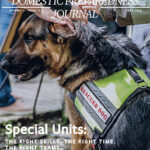Three previous public health articles in the November 2013, March 2014, and July 2014 issues of the DomPrep Journal broadly examined serious pathogenic threats that are emerging and evolving around the world to assess preparedness levels before their possible arrival in the United States. Not long after the delivery of the July 2014 issue, the discussion of U.S. preparedness for a serious novel pathogen became more than academic. The Ebola virus arrived in the United States within both expected and unexpected international travelers from West Africa – stressing again the great benefits and challenges of trade and travel in an ever-expanding globalized economy.
The arrival of Ebola and several other serious viruses in the United States provides another opportunity to evaluate strategies, policies, plans, procedures, and agreements through a whole-of-community or multisector approach. The strong public reaction and evolving policy response to the arrival and treatment of the Ebola virus demonstrates there is room for improvement in many diverse public and private sector organizations. Lessons have been learned and procedures have been modified to address a novel public health threat. The greater challenge may be to truly translate the lessons into tangible planning and preparedness achievements beyond the last serious novel pathogen arriving on U.S. soil.
Lessons Learned
As the Ebola outbreak appears to be managed within the United States and the world has been educated on this public health threat, interested planners and policy experts wonder if there will be long-lasting lessons implemented or if it shall be overtaken by the next emerging threat or geopolitical conflict. All too often, collective memories become short. With limited resources and the influence of the 24-hour constant news cycle, focus seems to shift from one issue to the next with few lasting effects.
Through many lessons learned by the domestic Ebola response, the Centers for Disease Control and Prevention (CDC) enhanced its recommendations for the management of the Ebola virus to include illness identification, specimen collection, personal protective equipment (PPE), waste handling, and many other important topics.
The CDC designated 35 hospitals for future Ebola treatment to improve domestic preparedness, over half near the five international screening airports. Additionally, the CDC increased the supply of Ebola-specific PPE in the Strategic National Stockpile to assist domestic hospitals in the care of patients; the PPE is configured into 50 pods for rapid delivery to affected hospitals.
The CDC updated its guidance regarding legal authorities for quarantine and isolation with legal, policy, and responsibility references. Although updated, the information remains rather imperfect due to its infrequent exercising and use. The website acknowledges that large-scale quarantine and isolation operations were last enforced during the Spanish Influenza (H1N1) pandemic in 1918.
The Government Accountability Office (GAO) identified in a 5 November 2014 WatchBlog lessons learned from previous infectious disease outbreaks, such as severe acute respiratory syndrome (SARS), H5N1, and H1N1 (2009), and their applicability to Ebola to prepare for the next outbreak. Through this GAO WatchBlog posting, many other valuable GAO reports are linked for reference with recommendations and lessons learned.
Time shall tell if the national public health planning and preparedness was insufficient or just not properly designed or tuned for such a severe and rare hemorrhagic fever such as Ebola. Ebola was on very few radar screens before its current re-emergence in West Africa. Nevertheless, these “black swan” events cannot be ignored and lessons must be learned by planners, responders, leaders, and lawmakers.
Sustained Congressional Interest
The Congressional Research Service (CRS) recently researched several topics for Congress regarding the Ebola outbreak and its implications for the United States. In August 2014, CRS analyzed immigration policies and issues on health-related grounds for excluding people from the United States. That CRS report identified that the Department of State, Department of Homeland Security, and Department of Health and Human Services each play key roles in the administration of laws for this complex subject. The report stressed that Congress plays an important oversight role of the departments for contagious diseases and potential pandemics.
In an October 2014 analysis of the international response to Ebola in West Africa, the CRS identified six possible issues for congressional consideration and action. The report concluded with five questions to include if the United States sufficiently supports pandemic preparedness.
Another October 2014 CRS report addresses the essential and sensitive subject of federal and state quarantine and isolation authority. The analysis identified the legal authorities for this rarely utilized practice as well as three legal challenges to quarantine authority to include due process concerns. This important reference document summarizes many of the issues requiring discussion and resolution before the arrival or emergence of the next unexpected serious communicable public health threat.
A December 2014 CRS report provided answers to frequently asked questions regarding the introduction and spread of Ebola in the United States. The report addressed issues involving quarantine authorities, passenger screenings, and airline procedures.
Another December 2014 CRS report reviewed the over $6 billion budget request to counter the Ebola outbreak. The report identified issues for Congress to include the establishment of an Ebola Contingency Fund that may conflict with existing laws and the implications of the pending Ebola Emergency Response Act (H.R. 5710). Over $5 billion in emergency funding was later approved by Congress to domestically and internationally fight the Ebola virus.
As the Ebola media coverage appeared to recede along with the active cases within the United States, congressional lawmakers continued to hold hearings for the additional funds requested for the Ebola response. Unexpectedly, the post-election hearings were poorly attended by lawmakers, spectators, and the media. Surprisingly, the newly appointed Ebola czar is reportedly returning to the private sector in early 2015. Even as the domestic interest may wane from Ebola, many crucial questions remain that require consistent attention.
An Unresolved Critical Issue – Quarantines
Lessons remain to be learned in several critical areas to include quarantine enforcement. There was immense debate and confusion about quarantine and isolation laws and policies, especially with the early state quarantine guidance announced in New Jersey, New York, and Maine. This rarely considered and implemented practice was the cause of great conflict, confusion, and political posturing. The concept of quarantine appeared to be more of a political than a public health issue. Fortunately, with the limited number of infected persons in the United States, due process and civil rights conversations were able to shape the discussion and political skirmish without a serious public health consequence.
Nevertheless, ignoring this difficult and critical social, legal, and political dispute will not make the next emergence any easier to handle in a timely, consistent, and legal manner. States shall likely lead the way once again with intrastate quarantines, but that does not alleviate the necessity for action by the federal government for border and interstate implementation.
A positive aspect of the confusion over the implementation of a quarantine order was the renewed focus on the process and laws. It is another opportunity to review unfamiliar and inadequate emergency plans. This is another chance to review old and new interpretations and perspectives for this legal challenge for numerous public and private sector organizations.
Ebola is just the latest serious public health concern to raise these legal and policy questions. They are not new. The response to the previous SARS international outbreak and H5N1 regional outbreak, and the challenges in handling them, identified the same issues and questions of today – especially for public health and law enforcement.
In September 2006, the Bureau of Justice Assistance issued The Role of Law Enforcement in Public Health Emergencies to address the special challenges for law enforcement, to include enforcing public health orders, securing contaminated areas, securing health facilities, controlling crowds, and protecting medical stockpiles. The document concludes with, “While threats to public health are not new, this is the first time in recent history that local and state law enforcement officials and policymakers have had to consider these threats in such depth.”
In a 2006 Police Chief magazine article entitled QUARANTINES: The Law Enforcement Role, numerous important issues and considerations were identified for state, local, and tribal law enforcement agencies to evaluate preparations for the enforcement of quarantines during a possible pandemic illness or biological terrorist attack.
In addition to the reports identified above, other sources of information, such as a 28 October 2014 legal sidebar, have been shared to provide knowledge and guidance to address quarantine and isolation authorities. Much of the same information in the valuable 2014 publications can be found in the 2006 and earlier publications stressing the importance of planning and preparedness. It remains to be seen if the attempted execution of state quarantines for Ebola will result in expanded guidance or if they will be discontinued before the establishment of much needed case law and commonly agreed upon practices.
Another Opportunity to Be Seized or Lost
This is a complex and complicated issue with many stakeholders for the application of rather unfamiliar laws and regulations. Much of the recent discussion focused only on specific politicians and public health officials – it appeared to burn brightly and quickly. The conversation did not overtly include the many other vital disciplines required to execute appropriate control measures, such as medical, fire/rescue, emergency management, law enforcement, military, and private sector partners.
Due to its rare implementation, political sensitivity, and lack of applicable modern case law, it becomes even more important to resolve authority and responsibility questions long before the next controversial discussion to execute a quarantine order. Unfortunately, the nation’s recent experience with quarantine enforcement left more questions than answers. It is too important and difficult to let the topic slip away into the shadows again because it is such a challenge. Ignoring it does not make it any easier or beneficial to society.
It is important to truly translate the lessons learned from Ebola into tangible planning and preparedness achievements. This is yet one more opportunity to plan before the arrival of another public health threat that has a more serious impact than the current Ebola virus strain did in the United States in 2014.
The opinions expressed herein are solely those of the author in his individual capacity, and do not necessarily represent the views of his agency, department, or the U.S. government.

Robert C. Hutchinson
Robert C. Hutchinson, a long-time contributor to Domestic Preparedness, was a former police chief and deputy special agent in charge with the U.S. Department of Homeland Security (DHS), Homeland Security Investigations in Miami, Florida. He retired after more than 28 years as a special agent with DHS and the legacy U.S. Customs Service. He was previously the deputy director for the agency’s national emergency preparedness division and assistant director for its national firearms and tactical training division. His over 40 writings and presentations often address the important need for cooperation, coordination and collaboration between the fields of public health, emergency management and law enforcement, especially in the area of pandemic preparedness. He received his graduate degrees at the University of Delaware in public administration and Naval Postgraduate School in homeland security studies. He currently serves on the Domestic Preparedness Advisory Board.
- Robert C. Hutchinsonhttps://www.domesticpreparedness.com/author/robert-c-hutchinson
- Robert C. Hutchinsonhttps://www.domesticpreparedness.com/author/robert-c-hutchinson
- Robert C. Hutchinsonhttps://www.domesticpreparedness.com/author/robert-c-hutchinson
- Robert C. Hutchinsonhttps://www.domesticpreparedness.com/author/robert-c-hutchinson






